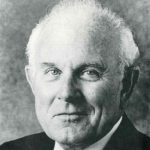Raymond O’Brien epitomizes the importance of vision in the highly competitive world of trucking, a person who accepted the changes imposed by deregulation as opportunities, not as problems. O’Brien, a 1991 recipient of the Automotive Hall of Fame’s Distinguished Service Citation, joined Consolidated Freightways in 1958 as a controller, became president of the motor carrier subsidiary in 1973, and president of the overall company in 1975. He brought Consolidated Freightways through a tumultuous time in the trucking industry, leading the company to profits while other carriers struggled. He was also instrumental in bringing the major trucking companies together to establish a unified industry-wide labor contract bargaining group to negotiate with the Teamsters.
“During my initial 15 years at the helm of CF, the trucking industry went through perhaps the most significant change in its history. In 1980, the Federal Government deregulated interstate trucking, removing barriers to entry and bringing true competition to a market that had operated under strict government controls for half a century,” he said. “How we were to respond under deregulation actually began many years prior to 1980,” he continued. “In the early 1970s, we envisioned the need for an integrated, broad-based freight delivery network that could effectively serve the nation. That vision became the foundation for CF’s long-haul business in an eventually deregulated and newly competitive marketplace. “Our goal was a ‘freight-flow system’ spanning the U.S. with centrally-located consolidation centers, which in turn served a group of local terminals in a ‘hub and spoke’ configuration. It was a major long-term investment. At the time, we also determined that the changes to come demanded that we concentrate on our core business of trucking.”
When O’Brien joined CF, the company manufactured its own trucks – Freightliners – which were unique in the industry. “(It was) a revolutionary truck for the motor carrier industry,” O’Brien said. “Initially, the company produced trucks and trailers strictly for CF’s own use. We later broadened Freightliner’s scope and began selling trucks on the open market. The company became, and remains today, one of the leading truck manufacturers in the world.”
Still, it was obvious to O’Brien that retaining Freightliner was perhaps not in the company’s overall best interest. “The decision was made to sell Freightliner to Daimler-Benz in 1981,” he said. “That did two things for us: it gave us the financial resources and flexibility to make careful, reasoned long-term decisions; and it focused management attention on the core trucking business, our response to deregulation and meeting our customer’s needs in new competitive environments.
“We grew and prospered during those years because CF was positioned with the proper resources and a network in place to capitalize on opportunities of a deregulated market.” O’Brien says deregulation-and the opportunities it created-were the most significant change he’s seen in the trucking industry during his career. “Those opportunities were not only in the long-haul business,” he said. “Deregulation ‘fragmented’ what was a single motor carriage market into different markets and service levels, some that appeared very promising,” he said.
“We identified regional overnight trucking as a new market with significant potential. Regional trucking was not new; the concept of doing it overnight, on a 98 percent on-time consistent basis, was. That was the idea behind the ConWay regional carriers. Each of the ConWays were CF start-up companies, built from scratch, with the principal goal of providing overnight service in a specific region of the U.S. The Con-Ways have grown from a zero revenue base in 1983 to a nearly $700 million enterprise in 1990, and they are leaders in what has become perhaps the fastest growing segment of trucking since deregulation.”
O’Brien is just as enthusiastic about the industry’s future and the opportunity it holds for young people, as he is about its recent past. “The health of any industry, including the automotive industry, depends on a continual infusion of young people with enthusiasm, drive, new ideas and a will to succeed,” he said. “As the industry continues evolving as a global business, there are tremendous career opportunities for college graduates. And those opportunities are not just in engineering, manufacturing or finance. Today’s technicians, marketers and managers come from all educational backgrounds and fill many different roles in the corporate environment. “We probably need more liberal arts, general business and broad technical degrees,” he continued. “They bring an entrepreneurial spirit and are comfortable with today’s technology in ways graduates just a decade ago could not imagine.
The automotive industry is a great choice for developing the skills and gaining the experience that tomorrow’s managers will need to compete in the ‘one world’ marketplace that is our future.” O’Brien says one of the results of his own career has been an appreciation of the importance of the auto industry to the country’s economic well-being. “As a trucking company, CF, throughout its history, has been fortunate to have every major U.S. auto manufacturer as a principal customer. Through those business relationships, I have made a great many friends, some of whom remain today close associates and valuable sources of counsel and advice,” he said. “It has been through those relationships that I have come to understand and appreciate the critical importance of the U.S. auto industry to our nation ‘s economic prosperity and growth.”
